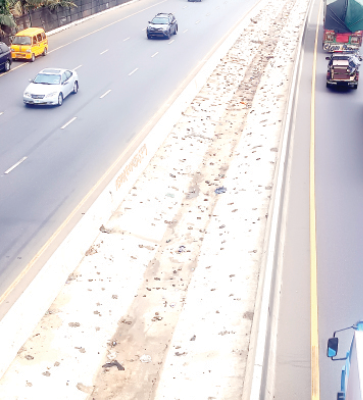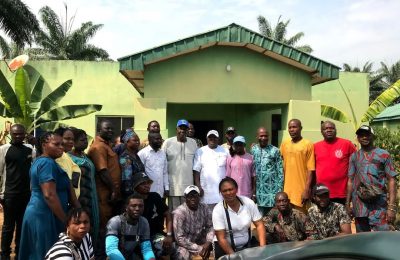

WHEN Bayo returned to Nigeria earlier this year, he was excited that he was going to experience the ride on the reconstructed Lagos-Ibadan expressway. He remembered how bad the road was when he was travelling from Ibadan to catch his flight at the Murtala Mohammed to the United States. The one and half hour journey in the early days of the Lagos Ibadan Expressway took him almost three hours to complete because of the dilapidated state of the road. But he heard things had changed now the that the road was repaired. He looked forward to a smooth ride on the road as the taxi left the airport headed towards the expressway. When Bayo got to Berger area of Lagos, he began to observe the quality of the road construction and was impressed. He was however appalled when he looked over to the median to see scores of mounds of human excreta in different shades of brown dotting the area.
Berger area is one of a number of hotspots on the Lagos-Ibadan Expressway where open defecation has become rife.

The Lagos Ibadan Expressway is arguably the busiest of highways in Nigeria. It connects Nigeria’s biggest commercial nerve centre, Lagos, with the rest of the country. Its construction was completed in August 1978. The road forms part of Arterial Route A.1 linking Lagos, through Ibadan, to the northern part of the country. It is also the road that links Lagos to the South-South and South-East states.
After many years, the road fell into a dire state of disrepair due to lack of maintenance.
In 2013, the then President Goodluck Jonathan flagged off the reconstruction of the 127.6 km-long road. The project was contracted to Julius Berger Nigeria Plc and Reynolds Construction Company Limited to handle Section 1 (Lagos-Sagamu Interchange) and Section 2 (Sagamu Interchange-Ibadan) respectively. A four-year period was given for its completion. However, in 2024, the project is still not completed. Official sources say that it was 94 percent completed as of the third quarter of 2023. In addition, the amount budgeted was reported to be N167 billion (about $839 million at the time) at the inception in 2013. However, over N315 billion is said to have been spent on the road till date.
Users of the road especially pedestrians have expressed displeasure over the practice of open defecation on the Lagos-Ibadan expressway. Apart from the fact that human excreta is a sight for sore eyes and the odour that emanates is nauseating, pedestrians have said crossing the road is almost like walking through a mine field as they try to avoid stepping on faeces. Others who mistakenly step on faeces find it highly embarrassing when the smell of faeces fills the commercial vehicle they boarded.
The hotspots for open defecation are located at the Ojodu Berger area, and Kara, Warewa and Mowe in Obafemi Owode Local Government Area of Ogun State, down to the Sagamu Interchange and Ogere.
Who are the culprits responsible for this? Some say that it is caused by miscreants who have no place to call home. Others point fingers at those who do trade along the expressway. There have been several calls by concerned members of the public for action to be taken to stop the practice.
Several plans to end open defecation
Nigeria has several plans to end open defecation, including the “Clean Nigeria: Use the Toilet” campaign, which aims to end open defecation by 2025. The campaign has the support of the World Bank, UNICEF, and the African Development Bank (AfDB).
In November 2018, former President Muhammadu Buhari declared a state of emergency in the Water, Sanitation, and Hygiene (WASH) sector, and launched the ‘Clean Nigeria: Use the Toilet’ as a national campaign for Nigeria to become Open Defecation Free (ODF) by 2025, a target many see as unrealistic.
In May, Minister of State for Environment, Ishaq Salako, said Nigeria needed to build one million public toilets to end open defecation. He spoke at a public hearing organised by the House of Representatives Committees on Environment, Water Resources, Works, Ecological Funds and Emergency and Disaster Preparedness.
He said that according to his ministry’s National Environmental Sanitation Policy, “43,000 toilets are required across the country. But currently, the reality is that 48 million people are practising open defecation nationwide, thereby requiring a minimum of one million toilets across the country. As of today, 5,004 toilets have been constructed across the country in public places.
“When the President signed the order, it came with an approval of N63.6bn to be spread over the six years when the programme to end open defecation would last but to date, what has been received is not up to an annual allocation.”
The Chief Sanitary Inspector, Environmental Health Council of Nigeria, Yakubu Baba, at the hearing said: “As we speak today, there is no agency that coordinates sanitation in the country and this is why I am calling on the legislature to look at the possibility of creating a National Environmental Sanitation Development Agency that would coordinate sanitation at the national level.”
Need for solutions
Apart from the unsightliness among other discomforts, open defecation poses a huge risk to public health. Professor Godson Ana, President of Environmental Health Scientists Association (EHSAN) said now that the rains are on, “fecal matter contaminates water bodies and shallow wells because of the run-off due to storm water. It also contaminates the soil. There are anti-microbials in the faecal matter that causes anti-microbial resistance scourge that is a major problem in society now. Open defecation results to water borne diseases like diarrhoea, and recently we have episodes of cholera. Cholera is transmitted through water and food. Indiscriminate defecation can exacerbate the cholera condition and promote dysentery. The vulnerable population like children will be the worst-hit for such poor environmental conditions. The air is not spared from pollution also because of microbes that are airborne.”
In his opinion, Samuel Ige, state president, Environmental Health Officers Association of Nigeria, Ogun State chapter, said that while in charge that axis of Obafemi Owode LGA where the Lagos-Ibadan Expressway runs through, “a lot of sensitisation and visits to community leaders there was done. We sensitised members of the public on the dangers of open defecation. The current director that is there is sustaining the campaign. The chairman of the local government is leading a team to sensitise the public on the importance of environmental sanitation. We are encouraging private participation in the provision of public toilets.” He said about two privately owned public toilets were already in place in the area.
Ogun State Commissioner for Environment, Ola Oresanya, while speaking to newsmen said his ministry had plans to apprehend defaulters. “We are going to employ the locals in the community to carry out the enforcement and we are going to pay them. What they are going to do is to chase away anyone who wants to defecate there. It is not rocket science to get this done. These people are going to be there day and night and anyone that proves to be recalcitrant will be given community service. The community service here is not to take them to prison. We will give them an apron and shovel to pack and clean the faeces along the median,” he said.
Speaking of solutions, Professor Ana said part of the solution to open defecation is behavioural change.
He said, “We have a very poor attitude towards the environment, so behavioural change is key. Two is the provision of amenities first at the household level. Many houses don’t have toilets so people resort to open defecation. Thirdly is the role of government in the provision of public toilet at designated locations like markets, motor parks, train stations and so on.”
Ana, a professor in the Department of Environmental Health Sciences, Faculty of Public Health at the University of Ibadan, Ibadan, added that there should be regulation and enforcement. “That is why there should be the provision of these facilities first, so that you can hold people accountable. Without making the provisions, it will be difficult to reprimand.”
Read Also: NNPC, NIPCO commission 12 CNG stations in FCT, Lagos








